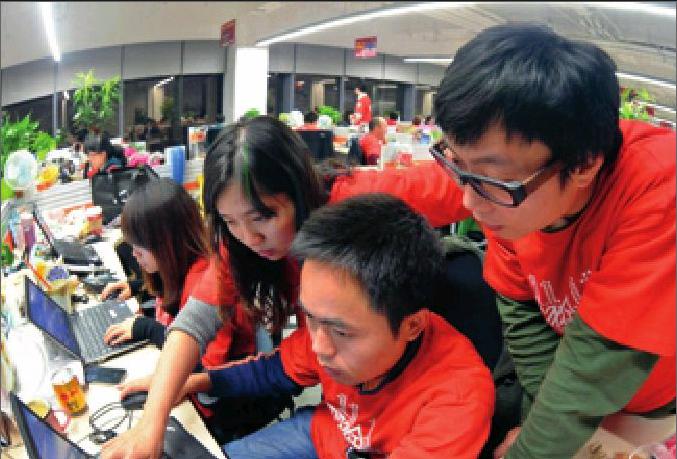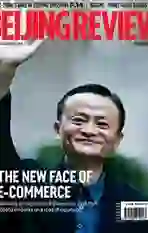OPEN SESAME
2014-10-23ByCorriedosh
By+Corrie+dosh


Alibaba Group Holding Ltd., the Chinese ecommerce behemoth that rivals Amazon and eBay, just became the biggest tech company that most Americans have never heard of. U.S. investors snapped up shares of Alibabas debut on the New york Stock Exchange (NySE) on September 19, pushing the company to a valuation of more than $231 billion—bigger than Facebook or Amazon and eBay combined.
Alibaba raised $21.8 billion through the sale, the largest listing in U.S. history. More than 100 million shares traded within 20 minutes and over 271.6 million shares exchanged hands by the end of the trading day. The offering price was hiked 10 times.
“This puts the United States on notice that global tech is about more than Silicon valley,”Rapid Ratings Chief Executive James Gellert told The Guardian. “Every tech company in the United States that is in Alibabas general business is paying close attention. This company is going to be a formidable competitor with a tremendous amount of cash.”
China is now well established as a major power in the Internet-driven future. While many Americans may be unfamiliar with the brand, a good portion of Chinas 642 million Internet users—about double the total U.S. population—favors Alibaba. And the market still has room to grow. The company has already invested in six U.S. startups, and is building an American online marketplace called 11 Main. Wall Street is eager to snap up shares of the company, seeing it as their best chance to buy into Chinas growth. Online shopping in China is expected to grow at an annual rate of 27 percent, according to iResearch Consulting Group.
The United States has much to learn from the meteoric success of Alibaba and its founder Jack Ma. The company has learned from its U.S. counterparts and avoided some of their pitfalls. Unlike eBay, sellers on Alibabas Taobao site do not pay a fee. Instead, revenue is generated through advertising and extra services, helping Taobao attract 58 million small and medium-sized retailers in addition to millions of amateur sellers. The company offers payment on delivery, a key factor to winning Chinese consumers trust.
Alibaba doesnt just link buyer and seller as eBay does, or sell to consumers like Amazon, or orchestrate payment fulfillment like PayPal—it does all of the above.
“People keep asking me whats the difference between Amazon, eBay and Alibaba. I would say Amazon and eBay are e-commerce companies and Alibaba is not an e-commerce company,” Ma said as he kicked off a global roadshow to raise capital. “Alibaba helps others to do e-commerce. We do not sell things. We call ourselves a company designing a platform, a company that is running an ecosystem.”
Alibaba has also diversified. While most of its profits come from its e-commerce business, most of its growth over the past few years has been from buying up existing companies. Ma recently bought a soccer team, a bank and a money management firm in China. Market experts expect the buy- ing spree to continue worldwide.
“Alibaba will definitely look for growth, not necessary in the West, but in the economies whose Internet economies are just beginning to accelerate,” said Brad Stone of BusinessWeek.
Worlds greatest bazaar
Alibabas meteoric rise has much to do with its visionary founder, Jack Ma. It is Ma who has taken the company from connecting businesses to each other to a scattering of ventures that let companies sell directly to the public(Tmall) and enable members of the public to sell to each other (Taobao). Due to the sheer size and growth of the Chinese market, the two ventures processed more transactions in 2013 than Amazon and eBay combined.
Ma started Alibaba in 1999 from his apartment in Hangzhou, east Chinas Zhejiang Province, and now employs some 24,000 workers. He has become the richest man in China, with his shares valued at $19 billion after the IPO.
“We have a dream,” Ma said as he rang the opening bell to officially launch the flotation on the NySE. “We hope in the next 15 years the world changes because of us. We hope in 15 years people say this is a company like Microsoft, IBM, Walmart. They changed, shaped the world. We want to be bigger than Walmart.”
Ma is an unusual CEO for a tech company. He reportedly failed the national college entrance exam twice before getting in due to low scores in mathematics. The son of professional storytelling and ballad-singing performers, he still does not know how to code. Reporters used to call him “Crazy Jack” for his animated way of speaking and bold goals.
Ma eventually became an English teacher, earning $12 a month at a local university. Crazy Jack then had his first entrepreneurial idea, launching a translation company. The idea took him to the United States, where he discovered the opportunities available on the Internet.
China Pages, his first e-venture, was a bust and he lost control of the company in a joint venture with China Telecom. Then, a few years later, he launched Alibaba.com. Within a few months the company had raised $25 million in venture capital, and an empire was born.
After the company filed for its IPO, Ma wrote an open letter to Alibaba employees. In it, Ma told the team that there is “unparalleled ruthlessness and pressure” ahead, but that the company can overcome it by sticking to its original mission and culture.
“We know well we havent survived because our strategies are farsighted and brilliant, or because our execution is perfect, but because for 15 years we have persevered in our mission of ‘making it easier to do business across the world, because we have insisted on a ‘customer first value system, because we have persisted in believing in the future, and because we have insisted that normal people can do extraordinary things,” Ma wrote.
HK rethinks rules
Alibabas choice of the NySE for its debut is interesting in that the company did not choose Hong Kong for its fundraising efforts. Hong Kong is traditionally the first stop for mainland companies when they want to issue an IPO overseas. But Alibaba decided against Hong Kong when regulators there refused to make an exception for the companys partnership system. The companys structure includes a small group of company insiders who nominate the majority of the board of directors without owning a controlling stake, reports the Associated Press.
Alibaba executives credit the unusual partnership system as necessary to preserve its innovative culture, but Hong Kongs listing committee said it would go against the exchanges“one share, one vote” principle. Dual-share partnership structures are more common in the United States, especially among tech companies.
The opportunity to list the biggest IPO of all time has prompted some Hong Kong regulators to rethink its rules on shareholding structures.
“The day for that debate has finally come,”wrote Charles Li, CEO of stock exchange operator Hong Kong Exchanges and Clearing Ltd., on his blog. The exchange recently issued a“concept paper” to solicit public opinion on“weighted voting rights.”
“Lets all be frank, it would have been nice if this could have been released earlier,” he added.
David Graham, Hong Kong Exchanges Chief Regulatory Officer and head of listing, said the decision was not based on the loss of the Alibaba listing, but the timing certainly seems more than coincidence. Should Hong Kong change its rules to attract blockbuster IPOs? Or, do the current rules make it fairer for all shareholders?
Whatever the solution, it is clear that Hong Kong will have to do something or risk missing out on the wave of Chinese tech companies hitting the market. The Hong Kong exchange has focused on commodities and derivatives, reports the Wall Street Journal, while nine of the 10 biggest IPOs by Chinese Internet companies since 2009 have gone to the United States.

The ethical consumer
The listing of Alibaba has heralded the new era of global commerce. China has firmly taken its place with a global brand, and an army of middle-class consumers to shift buying power to the East. The door that Alibaba is opening swings both ways. The company will raise billions in funding from the West, and global manufacturers will increasingly target Alibabas growing customer base. Already, companies like Apple and Starbucks are seen adjusting their products to target Chinese customers. The age of the Chinese consumer is at hand.
The implications of Chinas dominance in the global economy are many. As the worlds biggest customer, what responsibilities does China have in terms of ethical trade, labor conditions, environmental impact and the use of natural resources? Chinese consumers have the power to change the world. Its not enough just to consume—China has to lead.
Google was founded under a tongue-incheek slogan: “Dont be evil.” Alibaba would do well to follow a similar creed. As the company matures, it must now follow the guidelines of corporate social responsibility. As the labor market for the world, China already knows the dangers of unchecked profit maximization. Now is Alibabas chance to establish a new precedent.
The era of the informed, ethical consumer has arrived. In a recent survey by Penn Schoen Berland, 82 percent of consumers in China indicated that they would be willing to spend more on green products and services. If Alibaba truly wants to be a market leader, it will anticipate these ethical needs of its customer base and influence the market in a positive direction.
